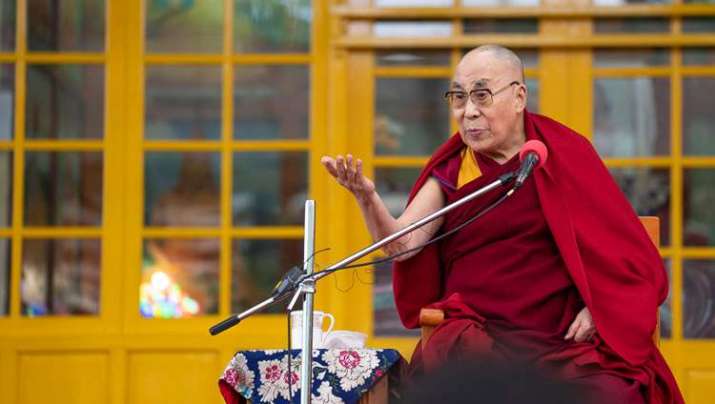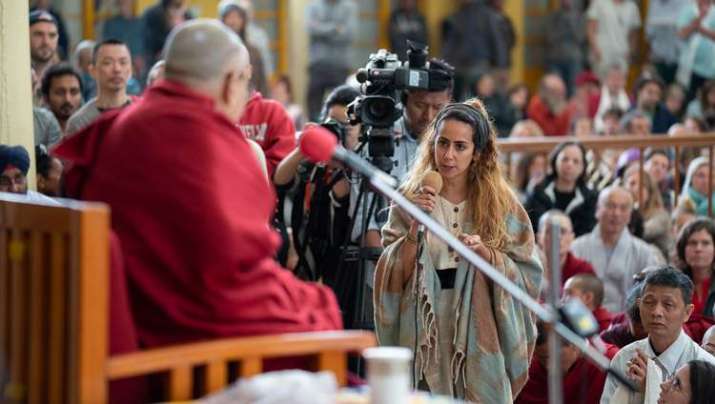NEWS
Dalai Lama Urges India to Abandon Caste System
 His Holiness addresses international visitors on Monday. Photo by Tenzin Choejor. From dalailama.com
His Holiness addresses international visitors on Monday. Photo by Tenzin Choejor. From dalailama.comDuring a meeting with international visitors on Monday, His Holiness the Dalai Lama criticized India’s caste system for creating division and emphasizing inequality, stating that it is “high time to give up this old notion,” and adding: “The time has come to acknowledge that the Indian constitution gives all citizens equal rights so there is no room for discrimination on the basis of caste—we are all brothers and sisters.” (The Times of India, The Office of His Holiness the Dalai Lama)
At the special meeting, organized by the Office of the His Holiness Dalai Lama, 500 visitors from 68 countries had a chance to engage in dialogue with the octogenarian Tibetan spiritual leader, who jokingly mentioned that rather than simply showing his face to the vistors, “I thought I should show you how brilliant this brain is.” The meeting took place in the Tsuglagkhang courtyard of the monastery adjoining his official residence in McLeod Ganj. (The Times of India)
His Holiness applauded India’s long history of secular ethics and its respect for all religious traditions. “India is home to all of the world’s major religious traditions and also respects non-believers. This is really wonderful and something to be proud of,” the Dalai Lama said. The caste system is the only backwardness left in India, he noted, adding that even the Buddha argued against the class division system, 2,000 years ago. (The Statesman)
“Mentally and emotionally we human beings are all the same. We all experience anger and hatred, even me too, but we also all have the potential to cultivate compassion, forgiveness, and tolerance. Destructive emotions are based on ignorance . . . constructive emotions like love and compassion are supported by reason, so we can use our brains to develop and strengthen them.” (The Office of His Holiness the Dalai Lama)
 An audience member asks a question during Monday’s meeting. Photo by Tenzin Choejor. From dalailama.com
An audience member asks a question during Monday’s meeting. Photo by Tenzin Choejor. From dalailama.comIt is not the first time that the Dalai Lama has spoken out against the caste system in India. Last year, he described it as feudal, stating, “This so called caste system was not created by God, not by any preacher, but by feudal systems. The landlords, including rajas and ranis, created an upper class and lower class in order to exploit other people. Eventually the lower class, psychologically (undermined), followed what the upper class said. But this is undemocratic . . . and is outdated.” (The Economic Times)
During Monday’s meeting, His Holiness emphasized the importance of embracing the oneness of humanity in our ever connected world. “There are over seven billion human beings on this planet. Unlike animals, we humans are equipped with the faculty to think and communicate. We should use this faculty to foster harmony and peace,” he said. “If we keep thinking about oneself, then the world will become very lonely. For instance, if I think of myself as the Dalai Lama and the rest as others, I will be very lonely.” (Phayul.com)
The Nobel Peace Prize laureate also discussed other pervasive notions of inequality. Recalling a visit to South Africa, he described how one person started arguing that there was a difference between black and white. “I told him to get a brain specialists and get a test of difference between the brain of a white and black person,” His Holiness related, adding that God has made no difference in human beings. (Times of India)
India’s caste system is believed to be more than 3,000 years old. While currently outlawed in the Indian constitution, the system remains culturally pervasive throughout the country. Although discrimination against lower castes is illegal, discrimination and violence remain rife.
One of the most groups most marginalized by the caste system are the Dalits, meaning “oppressed or broken”—a self-applied name for communities previously known as “untouchables.” To escape the discrimination of traditional caste-based society, many Dalits have turned to Buddhist conversion, which has given them a new community, and a new sense of self confidence and self worth.
See more
Dalai Lama meets with foreign tourists, urges oneness of humanity (Phayul.com)
India should shun caste system: Dalai Lama (The Statesman)
Indian caste system is very bad: Dalai Lama (The Times of India)
Caste system is undemocratic and outdated: Dalai Lama (The Economic Times)
Meeting with Visitors from Across the World (The Office of His Holiness the Dalai Lama)
Related News from Buddhistdoor Global
Dalai Lama to Reduce Foreign Travel due to Age and Exhaustion, says CTA
Dalai Lama Hosts 33rd Mind & Life Conference: Reimagining Human Flourishing
Two Explosive Devices Found in Bodh Gaya, Security for Dalai Lama Tightened
His Holiness the Dalai Lama Marks 82nd Birthday in Leh
Dalai Lama Joins Russian and Buddhist Scholars for Historic Dialogue in New Delhi
Dalai Lama Releases Free App for iPhone
Dalai Lama Urges Aung San Suu Kyi to Solve Rohingya Crisis in Letter
Dalai Lama Offers Prayer for Peace in Bodh Gaya
Data Shows Improved Literacy Rates, Gender Equality Among Buddhist Converts in India
90-year-old Buddhist Monk recalls “Babasaheb” Ambedkar’s Conversion to Buddhism
India’s Dalits Embrace Buddhism on Vijaya Dasami
Related features from Buddhistdoor Global
A Light in the Darkness of the Slums of India
Living Dr. Ambedkar’s Vision
Buddhistdoor View: The Complexities of Buddhist Conversion and the Indian Dalit Movement














